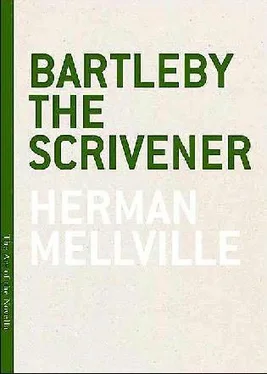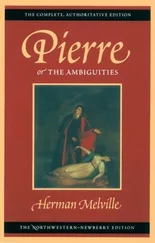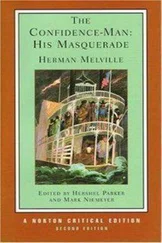Revolving all these things, and coupling them with the recently discovered fact that he made my office his constant abiding place and home, and not forgetful of his morbid moodiness; revolving all these things, a prudential feeling began to steal over me. My first emotions had been those of pure melancholy and sincerest pity; but just in proportion as the forlornness of Bartleby grew and grew to my imagination, did that same melancholy merge into fear, that pity into repulsion. So true it is, and so terrible too, that up to a certain point the thought or sight of misery enlists our best affections; but, in certain special cases, beyond that point it does not. They err who would assert that invariably this is owing to the inherent selfishness of the human heart. It rather proceeds from a certain hopelessness of remedying excessive and organic ill. To a sensitive being, pity is not seldom pain. And when at last it is perceived that such pity cannot lead to effectual succor, common sense bids the soul rid of it. What I saw that morning persuaded me that the scrivener was the victim of innate and incurable disorder. I might give alms to his body; but his body did not pain him; it was his soul that suffered, and his soul I could not reach.
I did not accomplish the purpose of going to Trinity Church that morning. Somehow, the things I had seen disqualified me for the time from church-going. I walked homeward, thinking what I would do with Bartleby. Finally, I resolved upon this;-I would put certain calm questions to him the next morning, touching his history, etc., and if he declined to answer them openly and unreservedly (and I supposed he would prefer not), then to give him a twenty dollar bill over and above whatever I might owe him, and tell him his services were no longer required; but that if in any other way I could assist him, I would be happy to do so, especially if he desired to return to his native place, wherever that might be, I would willingly help to defray the expenses. Moreover, if, after reaching home, he found himself at any time in want of aid, a letter from him would be sure of a reply.
The next morning came.
"Bartleby," said I, gently calling to him behind his screen.
No reply.
"Bartleby," said I, in a still gentler tone, "come here; I am not going to ask you to do any thing you would prefer not to do-I simply wish to speak to you."
Upon this he noiselessly slid into view.
"Will you tell me, Bartleby, where you were born?"
"I would prefer not to."
"Will you tell me _any thing_ about yourself?"
"I would prefer not to."
"But what reasonable objection can you have to speak to me? I feel friendly towards you."
He did not look at me while I spoke, but kept his glance fixed upon my bust of Cicero, which as I then sat, was directly behind me, some six inches above my head.
"What is your answer, Bartleby?" said I, after waiting a considerable time for a reply, during which his countenance remained immovable, only there was the faintest conceivable tremor of the white attenuated mouth.
"At present I prefer to give no answer," he said, and retired into his hermitage.
It was rather weak in me I confess, but his manner on this occasion nettled me. Not only did there seem to lurk in it a certain calm disdain, but his perverseness seemed ungrateful, considering the undeniable good usage and indulgence he had received from me.
Again I sat ruminating what I should do. Mortified as I was at his behavior, and resolved as I had been to dismiss him when I entered my offices, nevertheless I strangely felt something superstitious knocking at my heart, and forbidding me to carry out my purpose, and denouncing me for a villain if I dared to breathe one bitter word against this forlornest of mankind. At last, familiarly drawing my chair behind his screen, I sat down and said: "Bartleby, never mind then about revealing your history; but let me entreat you, as a friend, to comply as far as may be with the usages of this office. Say now you will help to examine papers to-morrow or next day: in short, say now that in a day or two you will begin to be a little reasonable:-say so, Bartleby."
"At present I would prefer not to be a little reasonable," was his mildly cadaverous reply.
Just then the folding-doors opened, and Nippers approached. He seemed suffering from an unusually bad night's rest, induced by severer indigestion then common. He overheard those final words of Bartleby.
"_Prefer not_, eh?" gritted Nippers-"I'd _prefer_ him, if I were you, sir," addressing me-"I'd _prefer_ him; I'd give him preferences, the stubborn mule! What is it, sir, pray, that he _prefers_ not to do now?"
Bartleby moved not a limb.
"Mr. Nippers," said I, "I'd prefer that you would withdraw for the present."
Somehow, of late I had got into the way of involuntarily using this word «prefer» upon all sorts of not exactly suitable occasions. And I trembled to think that my contact with the scrivener had already and seriously affected me in a mental way. And what further and deeper aberration might it not yet produce? This apprehension had not been without efficacy in determining me to summary means.
As Nippers, looking very sour and sulky, was departing, Turkey blandly and deferentially approached.
"With submission, sir," said he, "yesterday I was thinking about Bartleby here, and I think that if he would but prefer to take a quart of good ale every day, it would do much towards mending him, and enabling him to assist in examining his papers."
"So you have got the word too," said I, slightly excited.
"With submission, what word, sir," asked Turkey, respectfully crowding himself into the contracted space behind the screen, and by so doing, making me jostle the scrivener. "What word, sir?"
"I would prefer to be left alone here," said Bartleby, as if offended at being mobbed in his privacy.
"_That's_ the word, Turkey," said I-"that's it."
"Oh, _prefer_? oh yes-queer word. I never use it myself. But, sir, as I was saying, if he would but prefer-"
"Turkey," interrupted I, "you will please withdraw."
"Oh certainly, sir, if you prefer that I should."
As he opened the folding-door to retire, Nippers at his desk caught a glimpse of me, and asked whether I would prefer to have a certain paper copied on blue paper or white. He did not in the least roguishly accent the word prefer. It was plain that it involuntarily rolled form his tongue. I thought to myself, surely I must get rid of a demented man, who already has in some degree turned the tongues, if not the heads of myself and clerks. But I thought it prudent not to break the dismission at once.
The next day I noticed that Bartleby did nothing but stand at his window in his dead-wall revery. Upon asking him why he did not write, he said that he had decided upon doing no more writing.
"Why, how now? what next?" exclaimed I, "do no more writing?"
"No more."
"And what is the reason?"
"Do you not see the reason for yourself," he indifferently replied.
I looked steadfastly at him, and perceived that his eyes looked dull and glazed. Instantly it occurred to me, that his unexampled diligence in copying by his dim window for the first few weeks of his stay with me might have temporarily impaired his vision.
I was touched. I said something in condolence with him. I hinted that of course he did wisely in abstaining from writing for a while; and urged him to embrace that opportunity of taking wholesome exercise in the open air. This, however, he did not do. A few days after this, my other clerks being absent, and being in a great hurry to dispatch certain letters by the mail, I thought that, having nothing else earthly to do, Bartleby would surely be less inflexible than usual, and carry these letters to the post-office. But he blankly declined. So, much to my inconvenience, I went myself.
Читать дальше












